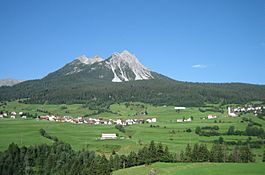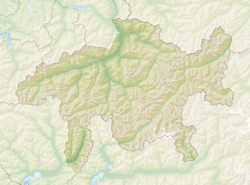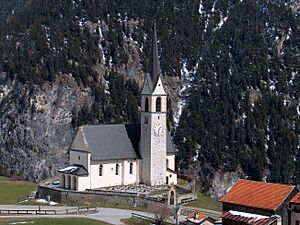Salouf facts for kids
Quick facts for kids
Salouf
|
||
|---|---|---|
 |
||
|
||
| Country | Switzerland | |
| Canton | Graubünden | |
| District | Albula | |
| Area | ||
| • Total | 31.41 km2 (12.13 sq mi) | |
| Elevation | 1,258 m (4,127 ft) | |
| Population
(Dec 2014)
|
||
| • Total | 216 | |
| • Density | 6.877/km2 (17.81/sq mi) | |
| Postal code |
7462
|
|
| Surrounded by | Andeer, Ferrera, Cunter, Mon, Pignia, Riom-Parsonz, Stierva, Zillis-Reischen | |
Salouf was a small village and a former town in Switzerland. It is located in the Sursés area, which is part of the Albula district in the canton of Graubünden.
Before 1943, its official name was Salux. On January 1, 2016, Salouf joined with several other towns to form a new, larger town called Surses. Most people in Salouf speak Romansh, a special language spoken in parts of Switzerland.
Contents
What is Salouf's Coat of Arms?
Salouf has a special symbol called a coat of arms. It shows a black shield with a white fleur-de-lys in the middle. A fleur-de-lys is a design that looks like a lily flower.
Around the fleur-de-lys, there are five silver stars, one in each corner and one at the bottom. This design comes from the shield of Benedikt Fontana, a local hero from Graubünden who lived in Salouf.
A Look at Salouf's History
Salouf was first mentioned in old writings way back in 1160. It was called Salugo then.
The village is famous for being the home of Benedikt Fontana. He was a brave Romansh fighter who died in 1499.
Where is Salouf Located?
Salouf covers an area of about 31.4 square kilometers (about 12 square miles). A large part of this land, about 42.5%, is used for farming. Forests cover about 28.2% of the area.
Only a small part, 1.2%, has buildings or roads. The rest of the land, about 28.1%, is made up of things like rivers, glaciers, or mountains.
The village of Salouf sits on a high ledge on the east side of a mountain called Piz Toissa, which is 2,657 meters (8,717 feet) tall. Besides the main village, Salouf also included two smaller settlements called Mulegn and Del.
People and Languages in Salouf
In 2014, Salouf had a population of 216 people. A small number of these people, about 1.9% in 2008, were from other countries. Over ten years, the number of people living in Salouf went down by about 3.2%.
In 2000, the population was almost evenly split between males (48.8%) and females (51.2%).
Many people in Salouf have a good education. About 69.5% of adults between 25 and 64 years old have finished high school or gone on to higher education, like university.
Salouf has a very low unemployment rate, meaning almost everyone who wants a job has one. In 2005, many people worked in farming, and others worked in factories or service jobs.
The number of people living in Salouf has changed over time:
| Year | Population |
|---|---|
| 1850 | 413 |
| 1900 | 287 |
| 1950 | 289 |
| 1960 | 233 |
| 1970 | 206 |
| 1980 | 157 |
| 1990 | 185 |
| 2000 | 280 |
| 2010 | 218 |
What Languages Do People Speak?
The main language in Salouf is the Surmiran dialect of Romansh. Even though fewer people speak it now than in the past, it's still very common. In 1880, almost everyone (99.1%) spoke Romansh. By 1980, it was 88.54%.
In 2000, most people (77.6%) still spoke Rhaeto-Romance (another name for Romansh). The second most common language was German (19.5%), and a small number of people spoke Portuguese (1.5%).
Here's a table showing how the languages changed over the years:
| Languages | Census 1980 | Census 1990 | Census 2000 | |||
|---|---|---|---|---|---|---|
| Number | Percent | Number | Percent | Number | Percent | |
| German | 13 | 8.28% | 24 | 12.97% | 40 | 19.51% |
| Romanish | 139 | 88.54% | 152 | 82.16% | 159 | 77.56% |
| Italian | 4 | 2.55% | 4 | 2.16% | 2 | 0.98% |
| Population | 157 | 100% | 185 | 100% | 205 | 100% |
Important Buildings in Salouf
One very important building in Salouf is the Tgesa Fontana, also known as Hotel Fontana. It is listed as a special heritage site because of its national importance.
See also
 In Spanish: Salouf para niños
In Spanish: Salouf para niños
 | Roy Wilkins |
 | John Lewis |
 | Linda Carol Brown |





